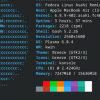Linux Users Are Spoiled
A friend got a new laptop with Windows XP pre-installed. "Does this come with an IRC program?" he asked. No, it doesn't. There are plenty of IRC programs for Windows, but you need to download and install them yourself. Word processing? Not included. Spreadsheet? Windows leaves you on your own yet again. I swear, by the time you buy or download all the software it takes to actually do something with Windows, you might as well install Linux. It would take a lot less time. I don't know about you, but my time is worth money, and if I need to do a whole bunch of software downloading and installation to make my computer usable, we're talking huge TCO (Total Cost of Ownership).
Because
of antitrust concerns, Microsoft needs to be careful about what kind of application software it ships with Windows. Microsoft reps sometimes point to Linux distributions and ask why they can get away with shipping stacks and stacks of applications without getting in trouble. The answer to that one, of course, is that the Linux distributions give you a choice. You aren't locked into one particular application. Most Linux distributions include several choices for most program classifications; even single-CD distros usually include several Web browsers and email clients.
We're starting to see PC vendors routinely offer OpenOffice.org and other free software -- for Windows -- pre-installed in some of their products. This is good. But I have been spoiled by the all-in-one nature of the typical Linux distribution. I install it, I start it up, and I have everything I need to jump right in and do desktop-level work immediately.
Since most popular Linux distributions have a free or nearly-free version available that includes necessary desktop applications, and virtually all of them can be installed and configured in well under an hour, we're talking about a tiny TCI (Total Cost of Installation).









































































